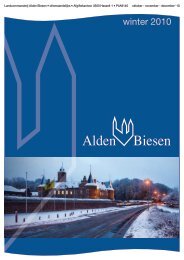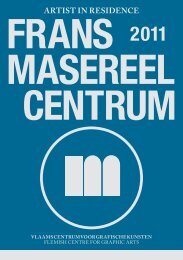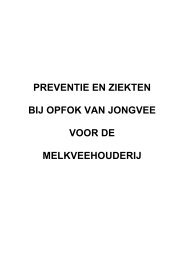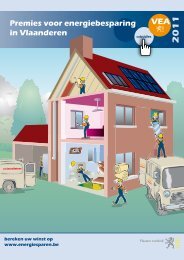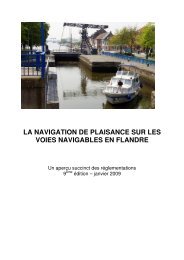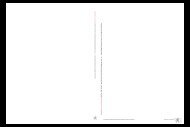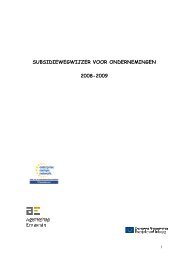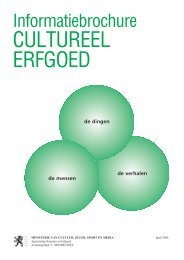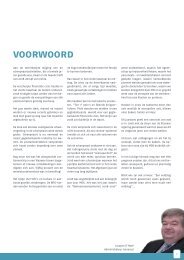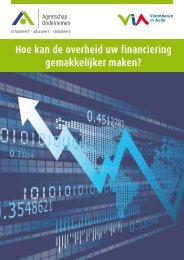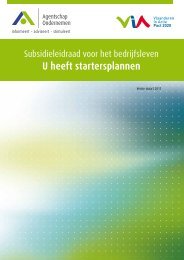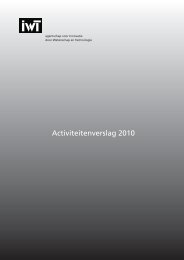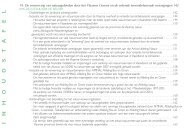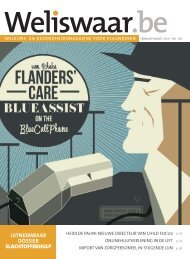Acknowledgements Book of abstracts - Publicaties - Vlaanderen.be
Acknowledgements Book of abstracts - Publicaties - Vlaanderen.be
Acknowledgements Book of abstracts - Publicaties - Vlaanderen.be
Create successful ePaper yourself
Turn your PDF publications into a flip-book with our unique Google optimized e-Paper software.
Sara Barbieri presents Poster 55 during the poster sessions in the Aula.<br />
Session theme 6: Free topics<br />
127<br />
Poster 55<br />
DEVELOPMENT OF A RISK ASSESSMENT APPROACH TO IDENTIFY<br />
POTENTIAL RISK FACTORS AFFECTING FISH WELFARE<br />
A. Afonso, D. Candiani, T. Grudnik, F. Berthe, O. Ribó, E. Aiassa, S. Barbieri, S. Correia, F.<br />
De Massis, S. Dhollander, P. Have, J. Serratosa<br />
European Food Safety Authority (EFSA), Animal Health and Welfare (AHAW), Parma, Italy<br />
Fish welfare is currently a topic with growing public interest but also a subject <strong>of</strong> considerable<br />
controversy since the assessment <strong>of</strong> the animal’s welfare status is complicated <strong>of</strong>ten by ethical<br />
considerations. The European Commission requested the AHAW Panel <strong>of</strong> EFSA to issue a<br />
scientific opinion on the animal welfare aspects <strong>of</strong> husbandry systems for farmed fish. The mandate<br />
was divided in 5 different questions covering the most relevant farmed species in Europe: i)<br />
Atlantic Salmon, ii) Rainbow and Brown trout, iii) Common Carp iv) Gilthead Sea bream and Sea<br />
bass and v) European eel. The development <strong>of</strong> the five scientific opinions is still in progress.<br />
The life cycle <strong>of</strong> farmed fish and the production systems were descri<strong>be</strong>d and a list <strong>of</strong> production<br />
inputs or conditionings with their potential welfare impact was identified based on the published<br />
literature. A risk assessment approach based on the Codex Alimentarius (WHO) methodology was<br />
developed to assess the potential risks for fish welfare.<br />
In this assessment a hazard is a production factor with a potential to cause an adverse welfare effect.<br />
Several categories <strong>of</strong> factors/hazards were evaluated, such as environmental conditions (abiotic and<br />
biotic factors), food and feeding, husbandry and management, genetic, diseases and impact <strong>of</strong><br />
disease control measures. The assessment takes into consideration the different production systems<br />
for each <strong>of</strong> the life stages <strong>of</strong> farmed species. A semi quantitative approach was used to estimate risk<br />
taking into account using expert opinion.<br />
A risk in animal welfare can <strong>be</strong> descri<strong>be</strong>d as a function <strong>of</strong> the probability <strong>of</strong> a negative animal<br />
welfare effect and the severity <strong>of</strong> that effect, consequential to the exposure to a hazard(s). The<br />
methodology used allows the ranking <strong>of</strong> potential factors taking advantage <strong>of</strong> a logical approach to<br />
descri<strong>be</strong> both the severity <strong>of</strong> the effect and the population’s probability <strong>of</strong> exposure.<br />
Contact information: Ana Afonso or email ana.afonso@efsa.europa.eu<br />
Complete address: European Food Safety Authority (EFSA), Animal Health and Welfare (AHAW),<br />
Largo N. Palli 5/A, 43100 Parma, Italy<br />
Species: Fish



